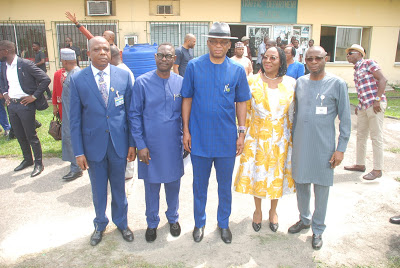 |
| Dr. Bashir Jamoh, President , Chartered Institute of Transport Administration, Nigeria |
The Chartered Institute of Transport Administration (CIoTA)
Nigeria, has expressed its determination to work with professionals in the
sector for solutions toward a more efficient service delivery as it drives
trade.
Nigeria, has expressed its determination to work with professionals in the
sector for solutions toward a more efficient service delivery as it drives
trade.
Dr. Bashir Jamoh, the newly-elected president of the institute and Executive Director, Finance and Administration at the Nigerian Maritime Administration and Safety Agency(NIMASA)made this
known on Tuesday during his investiture ceremony and the inauguration of the
National Executive Council/Governing Council, which held at the Rockview Hotel,
Apapa Lagos.
Jamoh said: “We want to create a platform to bring core professionals in
the transport sector from all disciplines and academies to ensure that issues
relating to the nation’s transport sector are addressed in robust manner.
the transport sector from all disciplines and academies to ensure that issues
relating to the nation’s transport sector are addressed in robust manner.
“We are going to collaborate with the Chartered Institute of Logistics
and Transport (CILT), the Chamber of Shipping and the Nigerian Institute of Shipping
to ensure that we achieve the target result.”
and Transport (CILT), the Chamber of Shipping and the Nigerian Institute of Shipping
to ensure that we achieve the target result.”
“It is not only for you to get transportation to move cargo or people,
but it is important that the service is efficient, getting it as at when you
should.”
but it is important that the service is efficient, getting it as at when you
should.”
The CIoTA President told the gathering that the institute would strategize
to pursue its objectives working to achieve short term, medium term, and long
term goals, in order to create enabling environment for operators and all
stakeholders in the sector.
to pursue its objectives working to achieve short term, medium term, and long
term goals, in order to create enabling environment for operators and all
stakeholders in the sector.
He commended the Federal Government’s rail construction across the
nation and expressed optimism that at least 50 per cent of the problems experienced
with the movement of cargo would be solved when cargo movement by rail begins.
nation and expressed optimism that at least 50 per cent of the problems experienced
with the movement of cargo would be solved when cargo movement by rail begins.
His words: “First, I will like to commend the Federal Government on the
rail revolution. The first thing we mentioned was that we should see how we can
revive inter-modal transportation, and today, we are using the rail line from
Abuja to Kaduna completed by this administration.
rail revolution. The first thing we mentioned was that we should see how we can
revive inter-modal transportation, and today, we are using the rail line from
Abuja to Kaduna completed by this administration.
“By the time we begin to look into moving cargo using the rail lines, you
will agree with me that most of the problems would be reduced by about 50 per
cent.”
will agree with me that most of the problems would be reduced by about 50 per
cent.”
Earlier in his keynote address, Prof. Pat Utomi, Founder, Centre for
Values in Leadership, bemoaned the dilapidated infrastructure and near-collapse of Apapa, considering the
perennial gridlock that causes untold hardship in the area as motorists spend
hours in traffic daily.
Values in Leadership, bemoaned the dilapidated infrastructure and near-collapse of Apapa, considering the
perennial gridlock that causes untold hardship in the area as motorists spend
hours in traffic daily.
Utomi charged the institute to provide workable frameworks for
government, in order to move the sector from the chaos it is presently faced
with.
government, in order to move the sector from the chaos it is presently faced
with.
He said: “The institute should be able to prescribe frameworks for
government on the sector. It is a tragedy today that Apapa is in the brinks of
collapse.”
government on the sector. It is a tragedy today that Apapa is in the brinks of
collapse.”
Speaking on the need to restrategizing to address the challenges in the transport sector, Utomi made reference to how the Volkswagen Company devised ways of moving its
cargo to its yard along the Badagry Expressway when the cement armada set in
1975 and caused congestion at the Apapa port and he noted that “We must learn to
deal with costs and benefits.”
cargo to its yard along the Badagry Expressway when the cement armada set in
1975 and caused congestion at the Apapa port and he noted that “We must learn to
deal with costs and benefits.”
In his goodwill message, Mr. Ibrahim Jubril, President of the Chartered
Institute of Logistics and Transport (CILT) Nigeria, said multi-modal transport system
remained the best effective approach.
Institute of Logistics and Transport (CILT) Nigeria, said multi-modal transport system
remained the best effective approach.
Jubril also frowned at the continued location of tank farms in
Apapa.
Apapa.
He emphasized the need for capacity building and professionalism in
transport management.
transport management.
Chairman of the Nigerian Port Consultative Council, Otunba Kunle Folarin,
urged the new president of the institute to recreate the value of Apapa, first,
by seeking and proffering lasting solution to the problem of the traffic gridlock.
urged the new president of the institute to recreate the value of Apapa, first,
by seeking and proffering lasting solution to the problem of the traffic gridlock.
In his acceptance speech, the new president pledged to work with a sense
of commitment to his duties at the institute, together with other members of
the new executive council.
of commitment to his duties at the institute, together with other members of
the new executive council.
































































